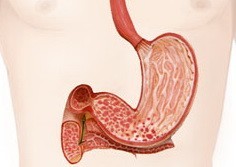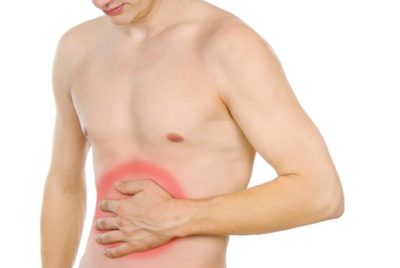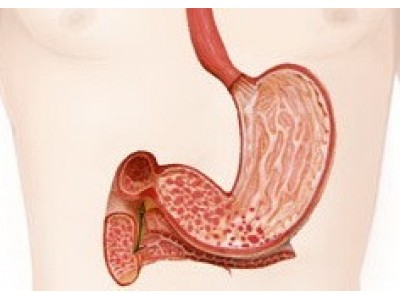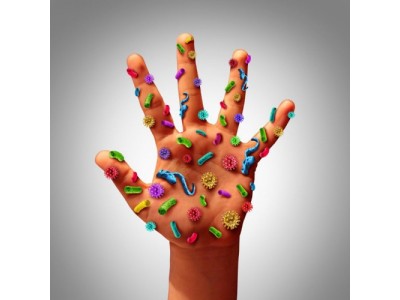 Gastroduodenitis is an inflammatory process that captures both the lower part of the stomach (pyloric zone) and the duodenum. Mostly adult people face this illness. Sometimes this pathology is called a variant of gastritis.
Gastroduodenitis is an inflammatory process that captures both the lower part of the stomach (pyloric zone) and the duodenum. Mostly adult people face this illness. Sometimes this pathology is called a variant of gastritis.
The main role in the development of gastroduodenitis plays affection by the mucous membrane of the stomach and duodenum. Causes that can cause the disease:
• Increased acidity, reduced production of mucus, which protects the tissues of the digestive tract - these conditions can develop in connection with other diseases of gastrointestinal tract, hormonal imbalance, stress, autoimmune processes;
• Infection Helicobacter pylori;
• Unhealthy eating - irregular eating, drinking too hot, cold, spicy food;
• Smoking and drinking alcohol;
• Poisoning;
As a result of exposure to these external or internal factors, the mucosa is damaged, inflamed, may ulcerate.
Types of gastroduodenitis.
By the duration of the course of pathology, distinguish - acute and chronic gastroduodenitis.
According to the degree of mucosal lesions, they are:
• Catarrhal - edema and redness (initial stage);
• Erythematous - strong redness;
• Erosive - mucosal integrity disorder;
On the effect on the functions of the digestive system:
• In hyposelection - mucous secretes less active substances, digestion slows down. In severe cases, there is atrophy, when tissues cease to perform their functions;
• Hypersecretory - with the release of more acid;
• In normal secretion - the affected mucosa secretes normal amounts of digestive juices;
 Symptoms of gastroduodenitis.
Symptoms of gastroduodenitis.
Patients often describe different symptoms of this disease. By type, there are two types of course of the disease - ulcerative (typical for adult patients) and gastritic (more common in children).
In the first case, the appetite is normal. There may be pain on the empty stomach, but it is also present after overeating. The patient complains of pain in the abdomen, can accurately indicate where it hurts. There is nausea. If there was vomiting - the patient at first feels better, but then the pain returns. There are complaints of heartburn.
In gastritis -like form of illness, it is difficult for the patient to identify the source of pain. Nausea and vomiting occur less often. Patients lose their appetite and lose weight. After eating, there is a heaviness and a feeling of overflow of the stomach, eructation.
In any case, symptoms of an inflammatory process, such as:
• Weakness, lethargy;
• Low-grade fever;
Diagnosis of gastroduodenitis.
Examinations and conversations with the gastroenterologist are not enough to make such a diagnosis. This requires various additional studies:
• General blood analysis;
• Measurement of pH (acidity) of different parts of the stomach and intestines;
• Ultrasound, gastroscopy;
• Histology of specimens of the gastric mucosa, intestines;
In addition, other studies, such as the determination of the motor function of the digestive system, can be prescribed.
Treatment of gastroduodenitis.
It is impossible to cure this disease of the digestive system by simply applying medication. The patient should understand that, depending on the diet and the regime, hardly, perhaps, much of the success.
Feed the patient should low-fat varieties of meat (beef, chicken), vegetable dishes, and porridges. All this is steamed, stewed or boiled. It is advisable to eat crushed food (mashed potatoes). To eat patients should at least five times a day in small portions. Before going to bed do not eat! The patient is not allowed to take alcohol, smoke and drink coffee (and also other irritating drinks).
Treatment with medicines should be directed to:
• Destruction of Helicobacter pylori;
• Decrease in acidity (with a hyperacid form) or stimulation of digestion (with a hypocidal form);
• Healing of the mucosa;
Treatment of gastroduodenitis with folk remedies.
Traditional medicine offers many tools that help to combat the various symptoms of this disease. For example, in meteorism, a decoction of fennel (10 g of fruit), anise (10 g of fruit) and peppermint (20 g of leaves) is advised.
Dietary nutrition can include flaxseed oil and flax seeds, which have a good enveloping effect.
Rhizomes of aira decoction is drunk before eating (for half an hour to 50 ml not more than four times a day). To prepare this product take 10 g of powder, steamed in a glass of boiling water and kept in a water bath for a quarter of an hour. Then cool and filter. St. John’s Wort is often used. To get a decoction, 10 g of raw material is poured into a glass of cold clean water, heated and brought to a boil in a water bath - the total heating time is about half an hour. Then cool and filter, add pure water to a volume of 200 ml. Such a drug should be taken at 50 ml for half an hour before meals.



